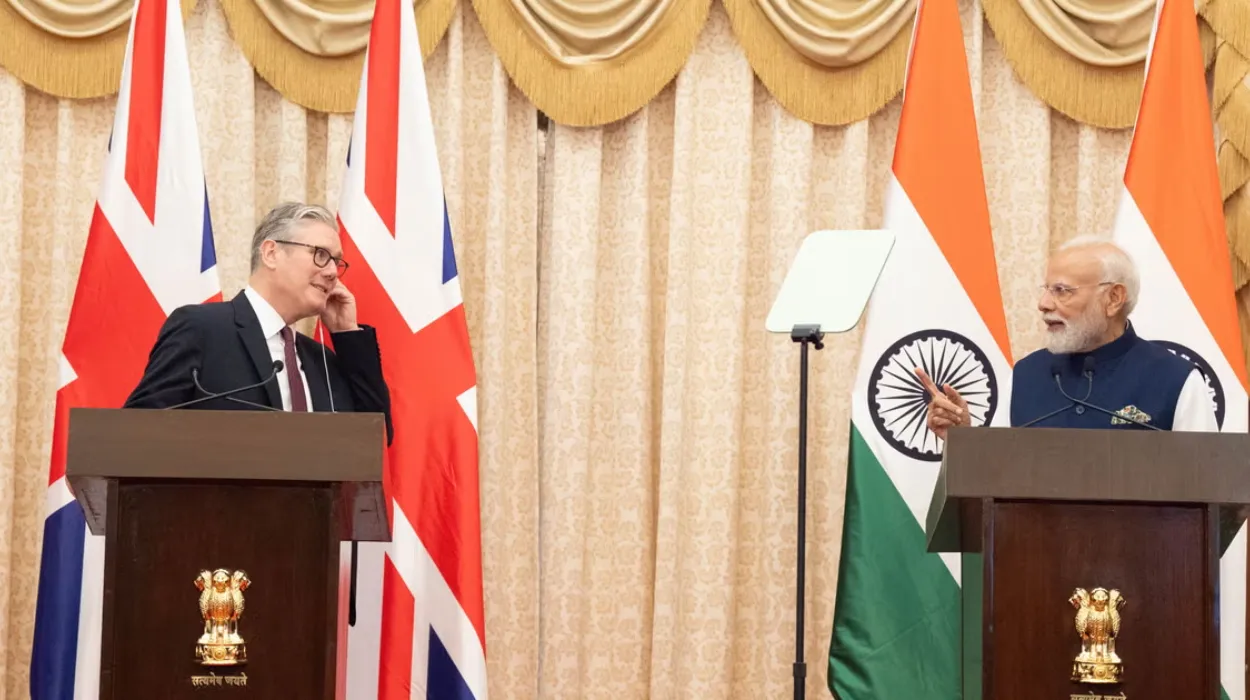India (Parliament Politics Magazine) – The UK signed a £350m defence deal with India for air missiles, boosting 700 jobs in Northern Ireland and advancing joint defence production efforts.
As reported by The Independent, during Prime Minister Sir Keir Starmer’s visit to India, the UK confirmed a £350m deal to supply air defence missiles and launchers to the Indian Army.
UK-India defense deal
The Ministry of Defence said it will build the missiles in Northern Ireland, creating jobs for about 700 local workers.
The Thales plan in East Belfast is producing these missiles for Ukraine. They can fly faster than 1.5 times the speed of sound and hit targets over 6 km away, including enemy vehicles, boats, and drones.
Britain and India have reached a £250 million agreement to work together on electric engines for naval ships. This comes while Keir Starmer is visiting Mumbai for a two-day trade trip.
At the same time, the UK’s Carrier Strike Group is taking part in air and sea exercises in the western Indian Ocean.
John Healey’s views on the UK-India defence deals and jobs
Defence Secretary John Healey stated,
“The defence deals announced today show how our growing strategic partnership with India will boost UK business and jobs.”
He said,
“I am hopeful that this will pave the way for a deeper relationship between our two defence industries, particularly in the development of electric engines for naval ships and in air defence.”
Mr Healey added,
“As we deepen our defence relationship with India, we will harness the UK defence industry as an engine for growth, securing vital jobs in Northern Ireland and throughout the UK.”
Keir Starmer and Narendra Modi’s meeting
Sir Keir Starmer met Indian Prime Minister Narendra Modi during his first visit to India on Thursday.
Mr Modi called the visit “historic.” The talks focused on improving trade and business links after the UK-India agreement was signed in July.
Mr Starmer said,
“The prime minister and I also discussed the need for a just and lasting peace in Ukraine, the need for stability and security in the Indo-Pacific, and the need to co-operate in critical areas like climate and energy, including breaking away from dependence on fossil fuels.”
He said he hopes India, as a “global player,” can take “its rightful place” on the UN Security Council, a long-standing national goal.
The Prime Minister announced that more British universities will expand into India, with the government projecting a £50 million boost to the economy.
Mr Starmer added,
“I’m delighted that more Indian students will be able to benefit from a world-class British education in the near future – strengthening the ties between our two countries while pumping millions back into our economy and supporting jobs at home.”
He said,
“With India set to be the third biggest economy in the world by 2028, and trade with them about to become quicker and cheaper, the opportunities waiting to be seized are unparalleled.”
The prime minister continued,
“That’s why I’ll be flying the flag for British business alongside 125 of our biggest household names in Mumbai this week, because growth in India for them means more choice, opportunity and jobs at home for the British people.”
During his first day in India, Mr Starmer held talks with Nandan Nilekani, founder of India’s digital ID system, amid plans to introduce a similar ID for workers in the UK.
Keir Starmer’s views on UK visas for Indian workers
Sir Keir Starmer announced he will resist calls from UK business leaders to expand visas for skilled Indian workers.
On his flight to Mumbai with more than 100 business leaders, the Prime Minister said that opening visas for Indian workers is not part of the plan.
Mr Starmer said,
“The issue is not about visas. It’s about … engagement and investment and jobs and prosperity coming into the United Kingdom.”
He confirmed that ministers are considering penalising countries that refuse to accept deported UK citizens.
Britain’s plan to introduce a digital ID card
Under Keir Starmer’s leadership, the UK aims to introduce a digital ID as a free app. This will be securely stored on people’s phones and used to prove identity, age, and residency status.
The digital ID will be mandatory for Right to Work checks, helping prevent illegal employment.
The scheme will make it easier for people to use government and private services without relying on paper documents. It also shows that illegal migrants will not be allowed to work.
The rollout is planned to be completed by the end of the current Parliament, with employers required to check digital ID for employment verification, while police will not be able to demand ID checks


